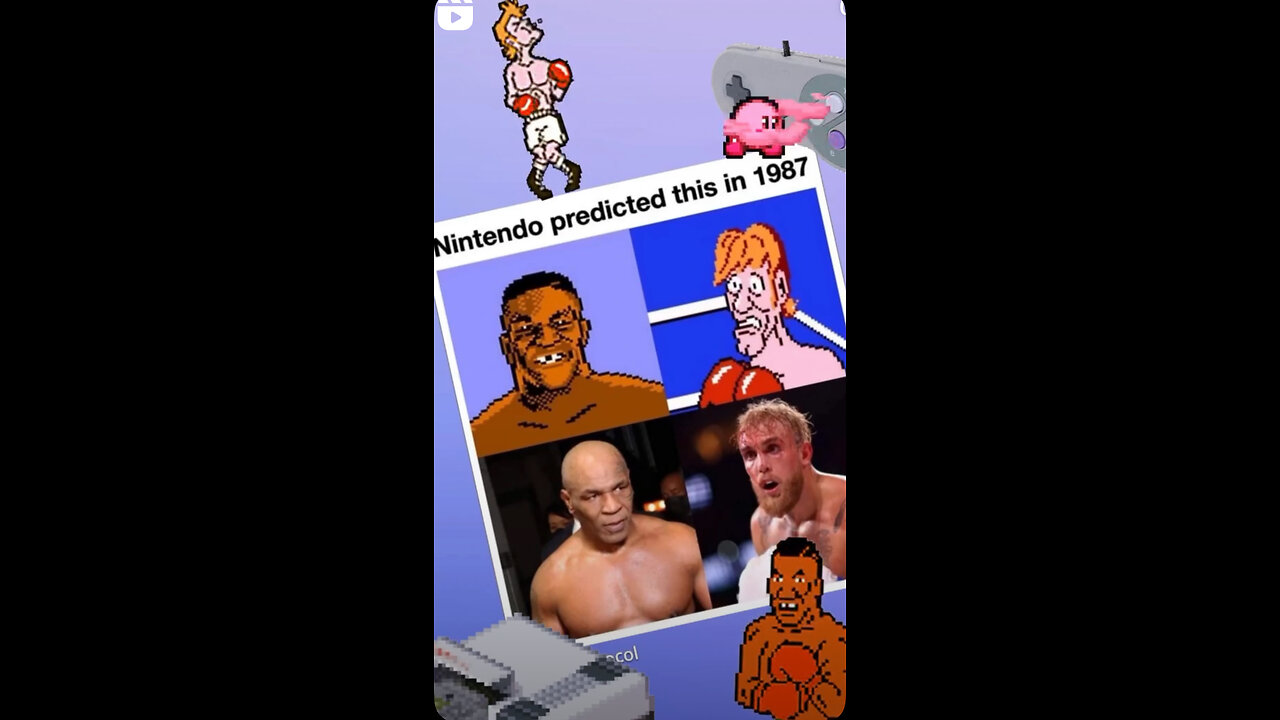Premium Only Content

Mike Tyson vs. Jake Paul: A Spectacle of Manipulation, Profit, and Cultural Engineering
The much-anticipated fight between Jake Paul and Mike Tyson ended with Paul emerging victorious by unanimous decision. The judges scored the bout 80-72, 79-73, and 79-73, a decisive win for the younger Paul. But as the dust settles, many fans and analysts are left questioning the legitimacy of the outcome. Was this truly a triumph of Paul’s skill and agility, or was it yet another example of modern sports becoming a carefully staged theater?
This article dives deep into the aftermath of the fight, exploring hidden narratives, connecting dots between financial incentives, media manipulation, and long-term agendas. What appears to be a simple boxing match may, in fact, reveal deeper truths about how society is being shaped and distracted.
1. A Carefully Scripted Outcome?
Jake Paul’s Meteoric Rise
Jake Paul’s ascent in the world of boxing is nothing short of remarkable—or suspicious. A YouTuber turned professional fighter, Paul has managed to dominate headlines and secure high-profile fights against seasoned athletes. The fight against Mike Tyson represents a culmination of this trajectory, but its results raise questions:
• The Scoring: A unanimous decision with scores as lopsided as 80-72 suggests domination, yet Tyson’s reputation as a fighter—even at 57—should have made such an outcome highly unlikely.
• Tyson’s Performance: Observers noted Tyson’s relatively passive approach during the fight, leading some to suspect that he was holding back. Was Tyson’s performance deliberately muted to serve a larger narrative?
2. The Financial Machinery Behind the Fight
Entertainment Over Authenticity
Modern boxing is increasingly shifting away from pure sport and leaning into spectacle. The Tyson-Paul fight was less about athleticism and more about drawing eyeballs, selling tickets, and dominating pay-per-view. Consider:
• Paul as a Cash Cow: Jake Paul’s fights consistently generate massive revenue streams. Keeping him undefeated—or at least dominant—is in the financial interest of promoters, sponsors, and streaming platforms.
• Tyson’s Role: Mike Tyson’s legacy as a ferocious heavyweight made him the perfect foil for Paul. A loss to a legend would have tarnished Paul’s marketability, whereas a win cements his image as a serious contender.
Manipulated Outcomes?
Behind the scenes, contracts in celebrity boxing often include clauses designed to protect the financial interests of all parties involved:
• No-Knockout Clauses: Rumors persist that some celebrity boxing matches include agreements preventing certain outcomes, such as a knockout by the older or less marketable fighter.
• Staged Competitiveness: Fighters may be instructed to make the match appear competitive while ensuring the desired winner emerges victorious.
3. The Cultural Engineering of Jake Paul
Jake Paul as a Manufactured Star
Jake Paul represents a new breed of celebrity: one whose fame transcends traditional categories. He is not just a boxer, but a brand, an influencer, and a media mogul. His victory over Tyson serves multiple purposes:
• Normalizing Absurdity: Paul defeating Tyson symbolizes the blurring of lines between sports and entertainment. It reinforces the idea that spectacle trumps authenticity in modern culture.
• Youth vs. Legacy: The fight’s outcome feeds into a broader narrative of generational change, where younger, social-media-savvy figures displace older icons.
Predictive Programming
The parallels to Nintendo’s Super Punch-Out!! cannot be ignored. The game, released decades ago, featured characters eerily similar to both Paul and Tyson. Was this a coincidence, or an example of predictive programming—a subtle way of priming audiences for future events?
4. The Role of Media in Shaping Perception
Controlling the Narrative
The media coverage of the fight has been overwhelmingly favorable to Jake Paul, emphasizing his skill, agility, and dominance. But this raises questions:
• Media Complicity: Are mainstream outlets complicit in promoting Paul’s narrative to maintain their access to future events and interviews?
• Distraction Tactics: The fight dominated headlines, diverting public attention from more pressing global issues. Was this spectacle deliberately timed to serve as a distraction?
Manufacturing Consent
By celebrating Paul’s victory and downplaying any controversy, the media reinforces the legitimacy of such events. This normalization makes it easier for audiences to accept similar spectacles in the future without questioning their authenticity.
5. The Deeper Implications
Erosion of Legacy
Mike Tyson’s willingness to participate in a fight against a YouTuber-turned-boxer raises uncomfortable questions about the commodification of sports legends:
• Selling Legacy: Does Tyson’s involvement signal a broader trend where historical icons are reduced to tools for entertainment and profit?
• The End of Authenticity: As sports become more about narratives and less about competition, the line between reality and fiction continues to blur.
Societal Manipulation
The Tyson-Paul fight can be viewed as a microcosm of larger societal trends:
• Dumbing Down of Culture: By elevating figures like Jake Paul, society shifts focus away from substance and towards spectacle, reducing critical engagement.
• Distraction from Real Issues: The fight’s widespread coverage may serve as a deliberate diversion from economic, political, and environmental crises.
6. What Comes Next?
The Future of Boxing
If the Tyson-Paul fight represents the direction of modern boxing, the sport risks losing its authenticity. Fans may grow disillusioned, leading to a shift toward alternative combat sports or grassroots boxing.
The Role of the Public
Audiences must recognize their role in perpetuating these spectacles. By consuming and celebrating such events, they contribute to the erosion of authenticity in sports and culture.
The Rise of New Narratives
As the line between sports, entertainment, and media continues to blur, society must grapple with larger questions:
• What defines success in a hyper-commercialized world?
• How do we preserve authenticity in a culture driven by profit?
Conclusion: A Fight Beyond the Ring
The Mike Tyson vs. Jake Paul fight was more than just a boxing match—it was a carefully orchestrated spectacle designed to entertain, distract, and profit. While Paul’s victory may appear legitimate on the surface, the deeper narratives surrounding the fight suggest a complex web of manipulation, financial incentives, and cultural engineering.
As audiences, we must question what we consume and why. Are we witnessing genuine competition, or are we complicit in a system that prioritizes spectacle over authenticity? The answers may hold the key to understanding not just the future of boxing, but the trajectory of modern culture itself.
-
 0:19
0:19
FragmentsOfTruth
2 days agoThe Hidden Dangers of Processed Meats: What Every Man Should Know About Prostate Health
55 -
 3:57:16
3:57:16
LumpyPotatoX2
4 hours agoNew Fortnite Season - #RumbleGaming
3.19K -
 15:06
15:06
Forrest Galante
19 hours agoShooting Invasive Flying Carp with a Bow
116K48 -
 6:39:16
6:39:16
Akademiks
22 hours agoThis is How Drake Comes Back!! Kendrick First Week Sales in. Diddy, Durk, YSL Update.
294K46 -
 10:29
10:29
TimcastIRL
2 days agoJoe Rogan SLAMS Joe Biden For ESCALATING The War In Ukraine
151K207 -
 14:21
14:21
Scammer Payback
25 days agoHacked Scammer Laptop to find their location
77.8K61 -
 1:07:55
1:07:55
Bright Insight
21 hours agoThis Happened on the JRE Podcast...
238K134 -
 34:52
34:52
MYLUNCHBREAK CHANNEL PAGE
1 day agoThe Lost City
239K112 -
 9:04
9:04
Tundra Tactical
20 hours ago $30.95 earnedTrump's AG Pick Pam Bondi is TROUBLE!
128K59 -
 1:02:02
1:02:02
PMG
1 day ago $21.33 earned"Man Films FBI Coming to His Home Over Alleged Social Media Posts - Jeremy Kauffman"
93.5K16